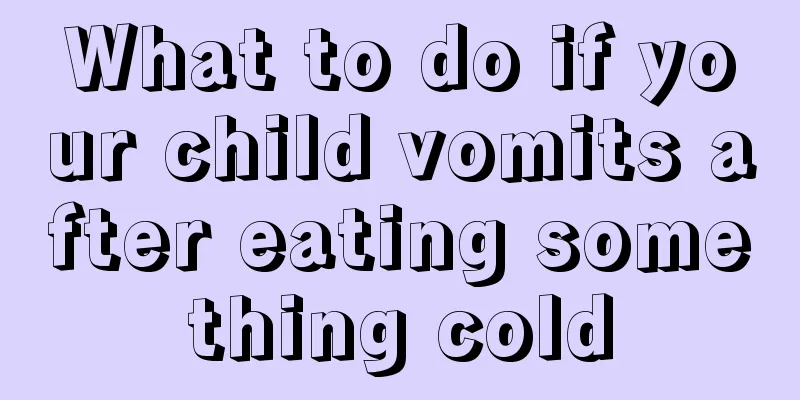Tips on Hand, Foot and Mouth Disease

|
Hand, foot and mouth disease is a relatively common infectious disease. The incidence rate is higher in children. It is generally caused by enterovirus infection. Parents must pay attention to their baby's hand, foot and mouth disease and take their baby to the hospital for relevant examinations and treatment in time. The peak season for nodules is during the transition between autumn and summer. Parents need to pay attention to this time and pay more attention to observing their babies. If there is any suspected illness, they must seek medical attention in time. 1. What is hand, foot and mouth disease? What are the symptoms after contracting the disease? Hand, foot and mouth disease is a common and frequently occurring infectious disease that mainly affects infants and young children. It can be caused by a variety of enteroviruses, EV71 being one of them. It can occur throughout the year, with the peak incidence being from May to July. Hand, foot and mouth disease mainly affects four parts of the body: hands, feet, mouth and buttocks. The symptoms of hand, foot and mouth disease are generally mild. Most patients often first develop fever symptoms, maculopapular rashes and herpes on the palms and soles of the feet (the area around the rashes may be red), herpes or ulcers on the oral mucosa, and obvious pain. Some patients may experience symptoms such as cough, runny nose, loss of appetite, nausea, vomiting and headache. A small number of patients have severe conditions and may develop complications such as encephalitis, meningitis, myocarditis, pneumonia, etc. The condition of some critically ill children progresses rapidly and may lead to death. 2. Who are the main sources of infection for hand, foot and mouth disease? Patients with hand, foot and mouth disease, asymptomatic carriers and asymptomatic carriers can all transmit the disease. During an epidemic, patients are the main source of infection and are usually most contagious within a week after onset of illness. 3. How is hand, foot and mouth disease transmitted? Is there a vaccine? Hand, foot and mouth disease has many transmission routes, mainly through close contact with the patient's feces, herpes fluid and respiratory secretions (such as droplets from sneezing, etc.) and contaminated hands, towels, handkerchiefs, cups, toys, tableware, bottles, bedding, etc. There is currently no vaccine for hand, foot and mouth disease, but it is completely preventable and curable as long as it is detected and treated early. 4. Who is susceptible to hand, foot and mouth disease? It is common among infants and children, and infants 3 years old and under are more likely to get the disease. Since adults have more complete immune systems, they generally do not become ill or have any symptoms once infected. However, the virus can be spread after infection, so adults also need to take precautions to avoid infecting children. 5. Is hand, foot and mouth disease a new infectious disease? Hand, foot and mouth disease is not a new infectious disease. It is a global infectious disease that was first recognized and named in 1957. Cases occur every year in countries around the world. Hand, foot and mouth disease was discovered in my country in 1981, and people fall ill every year. 6. Can hand, foot and mouth disease be cured? If you get hand, foot and mouth disease, in most cases you can recover on your own within 7-10 days without any sequelae or scars on your skin. Based on previous incidence and recovery records, only a few severe patients may develop meningitis, pneumonia, etc. Most of them can recover as long as they actively cooperate with the doctor's treatment. 7. What should I do if my child shows suspicious symptoms? If your child has symptoms such as fever or rash, you should go to a medical institution promptly and keep him/her closely monitored. |
<<: Hand, foot and mouth disease in children
>>: Is massage effective for children's cough?
Recommend
What is phimosis in children?
The health of the genitals should be paid attenti...
Nine-month-old baby development standard indicators
Ten months of pregnancy and one day of delivery e...
One-year-old baby suddenly refuses to drink milk powder
Most babies will drink milk powder during their g...
Why are baby's palms wet when he has a fever?
Infants and young children are prone to symptoms ...
What should I do if my baby has very loose stools?
It is normal for babies to have loose stools when...
What are the disadvantages of babies sucking empty bottles?
Babies who have not grown up yet are relatively f...
Hepatitis A in children
We all know that hepatitis A is a common disease ...
What are the methods for breast enhancement for adolescent girls?
Adolescence is a developmental process. Our bodie...
Children have sore throats. Do you know how to treat them?
When symptoms of sore throat appear in children, ...
My baby's hand is swollen because of something biting him.
Summer is the season with the most mosquitoes. Ba...
How can children overcome inferiority and become confident?
For children, if they have an inferiority complex...
How to treat poor stomach in infants and young children?
It is common for infants and young children to ha...
Why do children peel their hands?
Children's hands peeling mainly occurs when t...
Children's Massage for Sore Throat
The baby's sore throat is mostly caused by in...
18-month-old baby early education
For most people, teaching children should start f...









